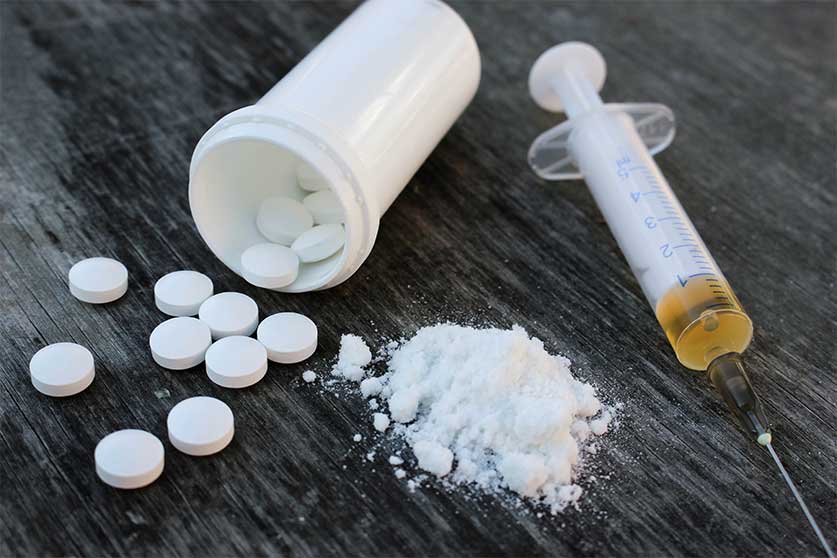Injecting Percocet | Effects & Dangers Of Shooting Percocet

Medically Reviewed By: Manish Mishra, MBBS

Written by: Dr Jason Martin Psy.D., LCPC
Percocet (oxycodone/acetaminophen) is frequently abused and occasionally crushed into a powder and injected. However, shooting Percocet or other prescription opioids is a dangerous and sometimes lethal form of drug abuse.

Percocet (oxycodone/acetaminophen) is used for managing moderate to severe pain after surgery or serious injury. However, the drug is widely abused for its euphoric effects.
Tampering Percocet for injection, which sometimes occurs with the goal of increasing the medication’s effects, can lead to serious emergencies and long-term health issues.
Effects Of Percocet Injection
Percocet contains a mixture of the potent semi-synthetic opioid/opiate drug oxycodone (also used in OxyContin) as well as the common over-the-counter pain reliever acetaminophen (Tylenol).
While liquid formulations of oxycodone and acetaminophen do exist for medical use, Percocet tablets are not intended for injection. Nevertheless, the medication is sometimes crushed into a powder, dissolved into water, loaded into a syringe, and injected into a vein.
When this occurs, the drug likely takes immediate effect, binding powerfully to opioid receptors throughout the central nervous system with highly pleasurable effects.
Dangers Of Shooting Percocet
While shooting Percocet has the potential to deliver a more intense, though shorter-lived, drug high, this practice is risky and can expose a person to short- and long-term dangers that include:
- infections
- drug overdose
- dependence and addiction
- organ damage
- increased side effects
Infection
Those who inject drugs recreationally, without medical grade equipment and sterilization procedures, run a high risk of contracting infections such as:
- skin infections and abscesses
- HIV
- viral hepatitis (hepatitis C)
- endocarditis
- and others
This risk is even greater when needles are shared between different individuals.
Overdose
When a medication like Percocet is taken by mouth it is broken down and absorbed relatively slowly in the digestive system.
In contrast, when the drug is taken all at once by shooting (or snorting, smoking, or plugging) the full dose may take effect all at once, overwhelming the body’s natural internal balance and increasing the risk of overdose.
Signs and symptoms that a Percocet overdose has occurred may include:
- jaundice (may occur up to 12 hours after the drug was used)
- cold, clammy, pale, and blue-tinted skin and extremities
- slow or irregular heart rate
- pinpoint pupils
- difficulty breathing or interrupted breathing
- confusion
- nausea and vomiting
- unresponsiveness (coma)
While naloxone (Narcan) can reverse respiratory depression caused by opioid overdose, the toxic effects of an acetaminophen overdose on the liver can only be treated by medical professionals.
Additionally, mixing Percocet with substances like alcohol, benzodiazepines, and other CNS depressants can increase the drug’s danger and complicate medical efforts.
If you suspect an overdose has occurred, immediately call 911 and provide first aid until help arrives.
Dependence & Drug Addiction
Injecting oxycodone can not only increase the drug’s euphoric effects but also its addictive potential.
As a result, those who inject prescription drugs often experience severe challenges in recovery, including intense withdrawal symptoms and cravings during detoxification.
Rehabilitation services provided in a professional inpatient/residential treatment center are highly recommended.
Organ Damage
Injecting Percocet can introduce not only harmful viruses, bacteria, and fungi into the bloodstream, but also damaging filler material. This sometimes includes unusual materials used to produce counterfeit opioid drugs (often made with fentanyl).
Because of this, those who inject Percocet or similar medications may develop inflammation and injury in the heart, heart valves, lungs, liver, and kidneys.
They may also experience injection site scars and abscesses, dangerous blood clots that can cause stroke or heart attack, collapsed veins, and other heatl issues.
Increased Side Effects
Common side effects of Percocet including constipation, nausea, sleepiness, vomiting, tiredness, headache, dizziness, and abdominal pain may be intensified when the painkiller is injected or used in higher than recommended doses.
Percocet Addiction Treatment
While injection is an addictive and dangerous way to misuse Percocet, any form of opioid abuse can cause serious injury, addiction, or death.
The best way to protect yourself or your loved ones is to enroll in a professional substance abuse and addiction treatment program like those hosted at Ohio Recovery Center.
At Ohio Recovery Center, we offer substance use disorder and behavioral health treatment options such as:
- inpatient medical detox to manage opioid withdrawal symptoms
- inpatient care in our modern, comfortable rehabilitation center
- medication-assisted treatment options using naltrexone, methadone, or buprenorphine
- behavioral therapy, including cognitive behavioral therapy
- dual diagnosis care to address co-occurring mental health disorders
- long-term aftercare support programs
To learn more about our treatment options, please contact us today.
- Food and Drug Administration (FDA) — PERCOCET® (Oxycodone and Acetaminophen Tablets, USP) https://www.accessdata.fda.gov/drugsatfda_docs/label/2006/040330s015,040341s013,040434s003lbl.pdf
- The Medical Clinics of North America — Infectious Complications of Injection Drug Use https://pubmed.ncbi.nlm.nih.gov/34823730/
- National Institute on Drug Abuse (NIDA) — Prescription Opioids DrugFacts https://nida.nih.gov/publications/drugfacts/prescription-opioids
- National Library of Medicine: MedlinePlus — Hydrocodone/oxycodone overdose https://medlineplus.gov/ency/article/007285.htm

